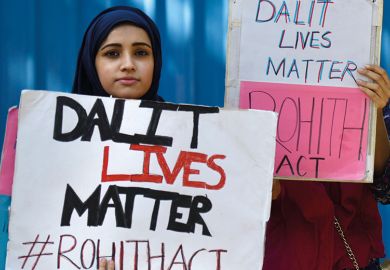Students and academics have decried a move by the Indian government to discontinue a scholarship for doctoral scholars from minority religious backgrounds, saying it will result in some of them losing access to the upper tiers of higher education.
Since its establishment in 2009, the Maulana Azad National Fellowship (MANF) has supported thousands of PhD students from Muslim, Buddhist, Christian, Jain, Parsi and Sikh religions.
The scheme gave awardees five years of funding towards a PhD or MPhil degree. Muslim students, who are underrepresented in India’s higher education system, made up the majority of MANF scholarship recipients, winning 66 per cent of the awards in 2021.
The Indian government has scrapped the scholarship on the grounds that it overlapped with other schemes, noting that minority students may qualify for scholarships on economic grounds. Students can also apply for merit-based scholarships.
But critics said that, in practice, the move takes away an opportunity for religious minority students unlikely to receive any other form of support.
“With the scrapping of MANF, the thousands of students who had ambitions to pursue a PhD or MPhil from esteemed educational institutions are at a standstill,” said Sanam Husain, president of the Jamia Millia Islamia unit of the Students’ Federation of India.
She noted that “most” institutions in India pay a “bare minimum stipend to the students enrolled in their research programmes”.
With other schemes that pay a similar amount awarded to a “limited number of students”, MANF was effectively “the only option” for some minority students to pursue a PhD, she said.
Ms Husain rejected the government’s argument about overlapping scholarships, calling it a “completely baseless argument” given that scholarship recipients must renounce any other form of government funding.
Aruma Khan, a doctoral researcher at the Zakir Husain Centre for Educational Studies at Jawaharlal Nehru University, agreed.
“The government took the decision of scrapping MANF with exceptional ease, without even giving a convincing or logically sound reason for doing so,” she said, adding that the scheme’s discontinuation was “not an isolated incident”.
In November, the pre-matric scholarship – meant to help minority children attend school – was significantly cut back.
Ms Khan said that, together, the two cases are “episodes of structural violence against the education of minority students, right from class 1 to the doctoral level”.
She worried about the knock-on effects of such moves, which she said would limit minority representation in the student body and also reduce the numbers of Muslim and other religious minority scholars further up the ladder.
Nandita Dhawan, an assistant professor at Jadavpur University, said that discontinuing the MANF “definitely cuts” opportunities for Muslim students.
While more reserved in her critique, Dr Dhawan expressed concern that the move took place without an in-depth study looking into the outcomes. She noted that, according to a report, applications to the MANF had declined in recent years.
“We need a proper study as to why that has happened,” she said.
Register to continue
Why register?
- Registration is free and only takes a moment
- Once registered, you can read 3 articles a month
- Sign up for our newsletter
Subscribe
Or subscribe for unlimited access to:
- Unlimited access to news, views, insights & reviews
- Digital editions
- Digital access to THE’s university and college rankings analysis
Already registered or a current subscriber?








